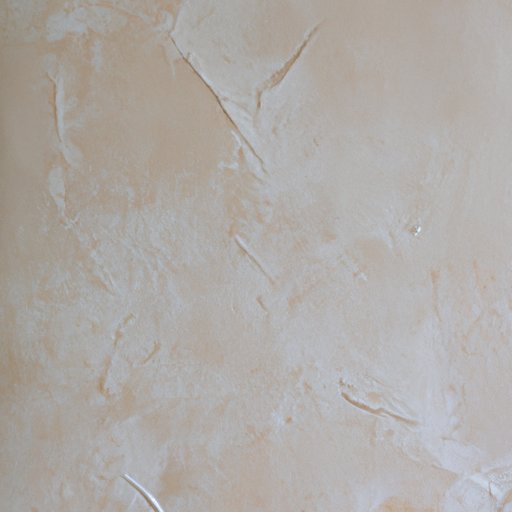
I. Introduction
One of the most common problems homeowners face when it comes to redecorating their walls is putting wallpaper on textured walls. The process can be frustrating, time-consuming, and oftentimes result in a poor finish. This article aims to provide you with a step-by-step guide, expert advice, and tips and tricks to help you successfully apply wallpaper on textured walls.
II. A Step-by-Step Guide: How to Apply Wallpaper on Textured Walls
Before diving into wallpapering your textured walls, there are a few materials you will need to get started. These include wallpaper paste, a smoothing brush or roller, a wallpaper knife or scissors, and of course, your chosen wallpaper.
To begin the process, smooth out any bumps or rough areas of your textured wall with sandpaper. Then, cut your wallpaper to size and apply paste to the back of the wallpaper. Make sure to apply the paste liberally to ensure good adhesion.
Next, carefully line up your wallpaper with the top of the wall and use your smoothing brush or roller to smooth it out. Work your way down the wall, smoothing it as you go while being careful to avoid air bubbles. Use your wallpaper knife or scissors to trim away any excess wallpaper at the bottom.
Repeat this process until the entire wall is covered in wallpaper. Leave the wallpaper to dry for at least 24 hours before making any other changes to the room.
It’s important to note that this process may take longer for textured walls than for smooth walls. It’s important to take your time to achieve the best finish.
III. Exploring the Pros and Cons of Wallpapering Textured Walls
While textured walls can add a unique and interesting touch to any room, they can also make wallpapering a bit of a challenge. Some of the advantages of putting wallpaper on textured walls include hiding flaws on your walls, adding a different texture to your walls, and even helping to insulate your room. However, the disadvantages of doing this project include that it can be difficult to achieve a smooth finish. The bumps and ridges of the textured wall can cause your wallpaper to bubble or pucker which can result in an uneven overall finish.
Additionally, it’s important to note that you should be careful about the type of wallpaper you choose to put on your textured walls. Heavy or thick wallpapers may not stick properly to the texture, while thin or lightweight wallpapers can tear or rip easily.
IV. Tips and Tricks for Successfully Installing Wallpaper on Textured Walls
To achieve the best finish when wallpapering textured walls, there are a few things you should keep in mind. Firstly, measure your walls carefully before beginning and cut your wallpaper to size to ensure an even finish. Additionally, priming your walls with a sealer prior to wallpapering can help smooth out any rough areas and help your wallpaper to stick better.
You should also be patient and take your time smoothing out your wallpaper as you go. Using a smoothing brush or roller and ensuring that you have a good adhesive on the back of your wallpaper will help to achieve the best finish.
V. Expert Advice: What You Need to Know Before Applying Wallpaper on Textured Walls
When it comes to expert advice, professional wallpaper installers recommend that you invest in a high-quality wallpaper with a good adhesive. This will help your wallpaper to stick better and also ensure that it lasts longer.
It’s also important to note that if you are uncertain about wallpapering textured walls, you should consider hiring a professional to handle the job for you. This can help to ensure a smooth finish and save you time and frustration in the long run.
VI. DIY Wallpapering on Textured Walls: Everything You Need to Know
While it may seem daunting at first, wallpapering textured walls is definitely doable as a DIY project. However, it’s important to do your research, invest in the right tools and materials, and take your time for the best finish.
Some common mistakes to avoid when wallpapering textured walls include not priming your walls beforehand, not measuring your walls accurately, and failing to apply enough adhesive to the wallpaper surface. By avoiding these mistakes and following the tips and tricks outlined in this article, you can wallpaper your textured walls like a pro!
VII. Conclusion
In conclusion, wallpapering textured walls is definitely a challenge, but it’s not impossible. By investing in quality materials, taking your time, and following the step-by-step guide and expert advice outlined in this article, you can achieve a smooth, professional-looking finish. Don’t be afraid to take on this project with confidence and transform your textured walls into a beautiful, unique feature in your home.




